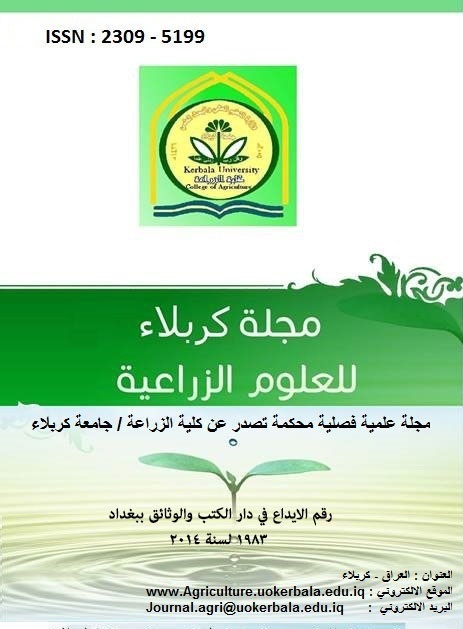The Induction of systemic Resistance in plants by UsingPlant Growth Promoting Rhizobacteria ( PGPR) to control the root knot disease on tamato caused by Meloidogyne spp
DOI:
https://doi.org/10.59658/jkas.v3i4.557Abstract
This study was conducted to determine the possibility of inducing a systemic resistance against the root knot disease caused by Meloidogyne spp. Two biological agents Pseudomonas fluorescens and Bacillus subtilis isolated from weeds in previous study were evaluated their efficiency separately or mixed in inducing the systemic resistance. The results showed that all treatments were able in reducing the penetration percentage of the second stage of Meloidogyne Larva to the roots of tomato plants comparing with the control. The biological mixture was the best with decreasing percentage reached 74.6% followed by P. fluorescens only with 71.2% and B. subtilis with 68.1%. Additionally, application of the biological factors in soil and rhizosphere of tomato plants was better than spaying them on the foliage of plants. As well as, the enzymatic parameters indicated to increase in activity of peroxide enzyme and accumulation of phenolic compounds in plants treated with the biological agents separately or mixed. The highest phenolic concentration was found in plants treated with the biological mixture followed by P. fluorescens only and B. subtilis only. Clearly, the data demonstrated that all treatments used in this study were able in inducing the systemic resistance in tomato plants against the root knot nematode and increasing of growth parameters thus it is encouraging in applied these biological agents particularly the mixture as biocide to control the root knot disease.
Downloads
Published
How to Cite
Issue
Section
License
Copyright (c) 2016 Copyright (c) 2024 is the Author's article. Published by the Journal of Kerbala for Agricultural Sciences under a CC BY 4.0 license

This work is licensed under a Creative Commons Attribution 4.0 International License.
Licensing Terms
All articles are published under a Creative Commons License and will be directed to the Creative Commons Attribution 4.0 International License (CC BY 4.0) That permits use, distribution, and reproduction in any medium, provided the original work is properly cited. This license also allows the work to be used for commercial purposes.
Use by both non-commercial and commercial users
This content is licensed under a Creative Commons Attribution 4.0 International (CC BY 4.0) license, permitting use by both non-commercial and commercial users. Individual users may access, download, copy, display, and redistribute the articles to colleagues, as well as adapt, translate, and text- and data-mine the content, subject to the following conditions:
- The author's moral rights, including the right of attribution and the right to protect their work from derogatory treatment, are respected.
- Where content in the article is identified as belonging to a third party, users must ensure that any reuse complies with the copyright policies of the owner of that content.
- If the article content is reused for research or educational purposes, users should maintain a link to the appropriate bibliographic citation, including the DOI and a link to the published version on the journal's website.






